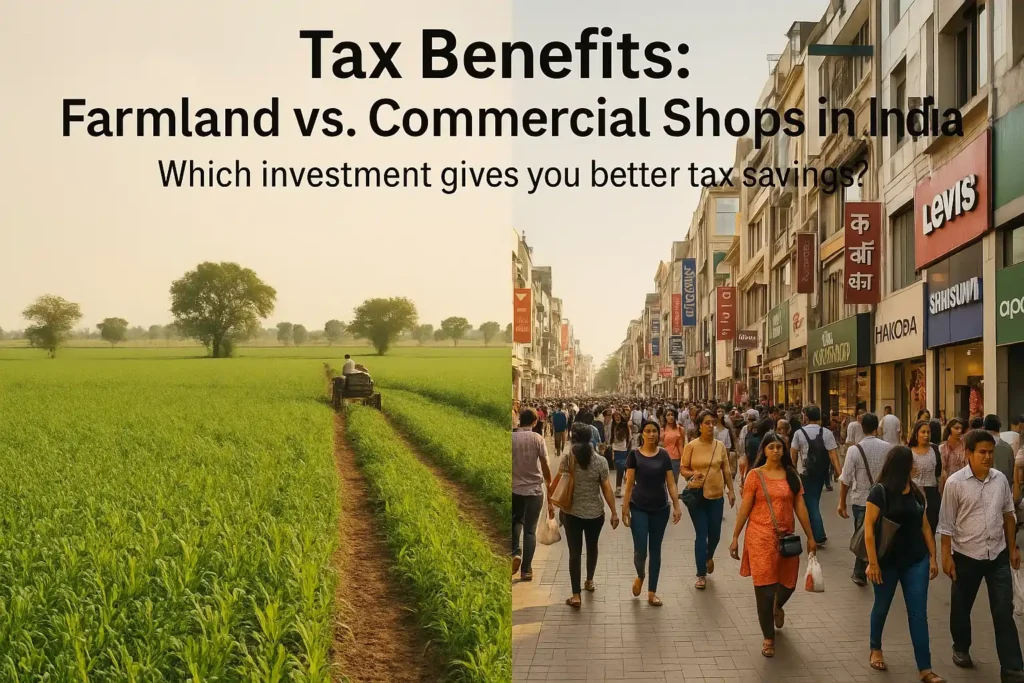The purchase of real estate is a trend in building wealth in India. Farmland and commercial shops are some of the numerous items one can decide to do as the prospects in the long run are very high. Nevertheless, in addition to profitability, tax advantages are also of a great importance in making investment decisions.

Understanding the Investment Types
What Is Farmland Investment?
Farmland refers to agricultural land used for growing crops, plantations, or animal husbandry. This type of land is typically located in rural areas and governed by state-specific agricultural laws.
What Are Commercial Shops?
Commercial outlets are either shops or offices in towns, which are used with a business aim. Such are the assets which can be discussed as the part of commercial real estate where municipal laws and regulations apply.
Key Tax Benefits of Investing in Farmland
1. Exemption from Wealth Tax
When the farmland is regarded as farmland (agricultural land), it is not an asset on Wealth Tax Act and land owners need not pay wealth tax on the farmlands. The advantage is not granted to commercial real estate.
2. No Capital Gains Tax on Rural Agricultural Land
When the farmland lies beyond the boundaries of the municipalities, any profit gained through the sale of the land does not expose an individual to pay capital gains tax under Section 10(1) of the Income Tax Act. By contrast, commercial shops are fully taxable upon sale, under long or short term capital gains regulations.
3. Agricultural Income Is Tax-Free
Income accrued in agricultural businesses (such as crop cultivation) are also excluded entirely from taxation of income under Section 10(1). This qualifies it to be a very tax-effective investment. Nevertheless, the rental or business income of the commercial shops is taken as full as 100 percent taxable under the head of Income from House Property or Business Income.
4. Lower Stamp Duty in Some States
States as Rajasthan and Madhya Pradesh entail lower stamp duties on the purchase of agricultural land especially when the purchaser is a farmer. This results in cheaper prices of purchase as opposed to the commercial shops which tend to command premium stamp duty and registration costs.
5. Exemption under Section 54B
When you are selling capital asset and subsequently invest the fund involved in the form of agricultural land then according to Section 54B you would be eligible to claim capital gains exemption. This is an advantage that is only provided in the agricultural land and not in investments of commercial shops.
Tax Treatment of Commercial Shops
1. Rental Income is Taxable
Raising of rent business shops would be charged under the head Income from House Property at applicable slab rates. Nevertheless, maintenance deduction on the rental income can be claimed at standard rate of 30 percent.
2. Depreciation Allowed
Assuming that the commercial shop forms part of a business, you may write off a depreciation Under Section 32 of the Income Tax Act and normally at the rate of 1/10 th percent per annum. This is a means of cutting down tax expenses.
3. Capital Gains Tax Applicable
If you sell a residential and commercial shop but held it for 24 months or more then long-term capital gains (LTCG) is taxed at 20% with indexation benefit. For income upto 24 months sec 117 types gains are taxed according to the slab rate of investor.
4. Goods and Services Tax (GST) May Apply
When the shop is either leased or sold to a business, the GST could be charged at a rate of 18 percent and this depends on the nature of the deal. On the other hand, in most instances farmland sales would not be subject to GST.
Compliance and Restrictions
| Feature | Farmland | Commercial Shop |
|---|---|---|
| Can be purchased by any Indian? | Restricted in some states to farmers only | Yes, anyone can buy |
| Tax on income earned | Exempt if from agriculture | Fully taxable |
| Wealth tax applicable | No | Yes |
| GST applicable | No | Yes, in some cases |
| Capital Gains Tax on sale | Exempt (if rural land) | Applicable |
Risks and Considerations
- Farmland may not generate regular income unless used for cultivation, leasing, or farm stays.
- Commercial shops offer better liquidity and monthly rental income but come with higher tax burdens and maintenance costs.
- Conversion of farmland for residential or commercial use is possible but requires state permissions and charges, which can be expensive.
Which One Should You Choose?
Choose Farmland If:
- You’re looking for tax-efficient long-term investments
- You want to benefit from exempt agricultural income
- You are eligible to buy land as per state laws
- You’re open to developing or holding land for appreciation
Choose Commercial Shops If:
- You prefer steady rental income
- You’re prepared for urban taxation and compliance
- You seek liquidity and resale opportunities in urban markets
The tax benefits associated with farmland are enormous and thus it is a great investment especially to long-term investors including those who have authority to purchase and operate farming land. Conversely, business stores can fetch consistent revenue and more liquidity but will incur more taxation and statutory requirements.
Understanding the tax treatment, exemptions, and compliance associated with both asset types is crucial. As always, consult with a certified tax advisor or real estate consultant before making any investment to align with your financial goals and legal standing.



